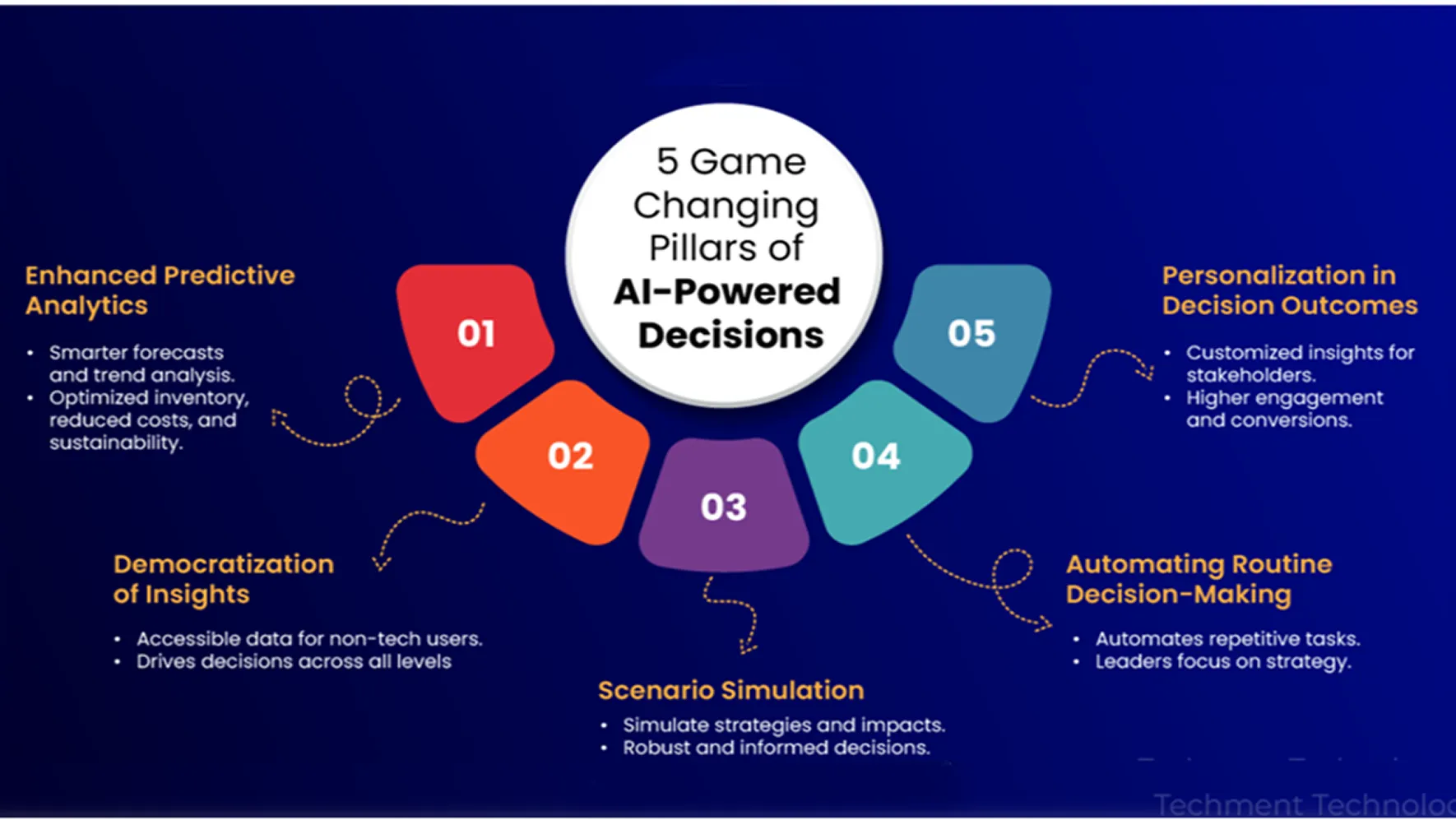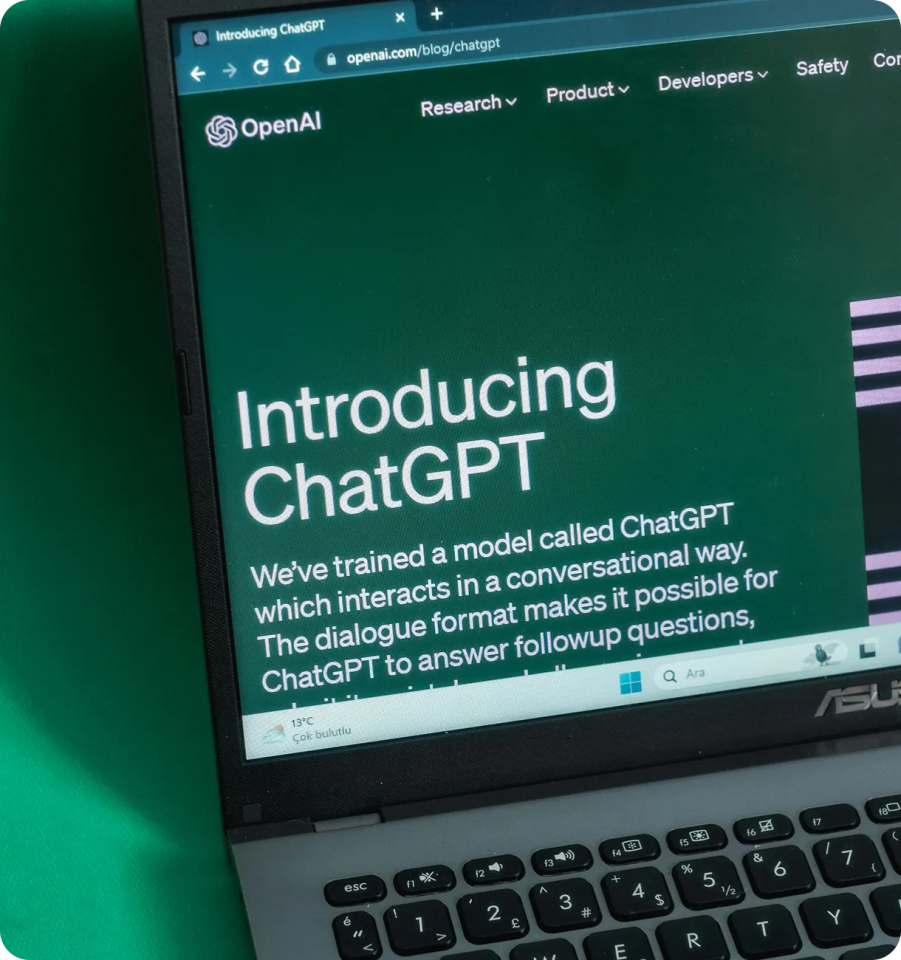Table of Contents
The CEO’s new toolkit
- The Strategic Shift: From Gut Instinct to Algorithmic Insight
- Forecasting the Future: AI-Powered Scenario Planning
- Innovation at Scale: Ideation with Generative Intelligence
- Communication Reimagined: AI in Executive Messaging
- Operational Efficiency: Automating the Executive Workflow
- Governance and Risk: AI as a Compliance Ally
- The Human-AI Partnership: Leading with Empathy and Intelligence
- Preparing for the Future: Building an AI-Ready Leadership Culture
- Final Thoughts: Leading Boldly with Generative Intelligence
In today’s high-stakes business environment, CEOs are expected to make faster, smarter, and more strategic decisions than ever before. The rise of Generative AI is redefining executive leadership—not just as a tool for automation, but as a partner in shaping bold, data-driven strategies. This blog explores how generative AI is transforming the C-suite, from forecasting and innovation to communication and governance.
1. The Strategic Shift: From Gut Instinct to Algorithmic Insight
For decades, executive decision-making relied heavily on intuition, experience, and historical data. But with markets evolving at lightning speed, CEOs need more than instinct—they need real-time intelligence. Generative AI offers predictive modelling, scenario simulation, and strategic content generation that empowers leaders to act with precision.
- CEOs can now simulate market shifts, competitor moves, and consumer behaviour using AI-generated models.
- Tools like Microsoft Copilot and ChatGPT Enterprise are being used to draft strategic memos, board presentations, and investor updates.
- The future of work. As the use of generative AI in companies continues to grow, employees are starting to collaborate with AI rather than just treating it as a tool. This means learning to work with AI iteratively and conversationally.
Reference: Microsoft Cloud Blog – Maximizing AI’s Potential Microsoft
2. Forecasting the Future: AI-Powered Scenario Planning
Generative AI enables CEOs to explore “what-if” scenarios with unprecedented depth. Whether planning a merger, launching a product, or entering a new market, AI can simulate outcomes based on millions of variables.
Use Cases:
- Generating financial forecasts based on macroeconomic trends
- Modeling supply chain disruptions and recovery paths
- Simulating customer response to pricing or branding changes
Example: A retail CEO uses generative AI to simulate the impact of inflation on consumer spending across regions, helping guide pricing strategy.
The rise of AI agents:
Already, 14% of organizations have implemented AI agents at partial (12%) or full scale (2%), and nearly one-quarter (23%) have launched pilots. Most (85%) executives are optimistic about AI agents progressing to handle one or more business processes in their functions over the next 3-5 years. Of the organizations already scaling AI agents, nearly 45% are piloting or scaling multi-agent systems, underlining the pace of adoption. Almost four in ten organizations today are optimistic that AI agents will evolve into self-learning entities that require minimal human supervision in the next 3-5 years.
Reference: Capgemini Research Institute – Generative AI in Organizations Capgemini
3. Innovation at Scale: Ideation with Generative Intelligence
Innovation is no longer confined to R&D departments. CEOs are using generative AI to ideate new products, services, and business models—often in collaboration with cross-functional teams.
How it works:
- AI generates product concepts based on market gaps and consumer feedback
- Suggests service enhancements based on competitor analysis
- Creates branding and messaging tailored to target demographics
Example: A fintech CEO uses AI to generate new financial product ideas based on underserved customer segments and emerging regulatory trends.
4. Communication Reimagined: AI in Executive Messaging
Clear, compelling communication is a cornerstone of leadership. Generative AI helps CEOs craft speeches, press releases, and internal updates that are aligned with tone, audience, and strategic goals.
Benefits
- Speeds up content creation for time-sensitive announcements
- Ensures consistency across channels and stakeholders
- Personalizes messages for different audiences (e.g., investors vs. employees)
Tools in use:
- Jasper AI for executive copywriting
- GrammarlyGO for tone refinement and clarity
- Synthesia for AI-generated video messages
5. Operational Efficiency: Automating the Executive Workflow
Generative AI isn’t just strategic—it’s practical. CEOs are using it to streamline daily operations, from meeting prep to policy drafting.
Examples:
- Summarizing board meeting transcripts
- Drafting HR policies and legal documents
- Generating performance dashboards and investor reports
Impact: More time for strategic thinking, less time spent on administrative tasks.
6. Governance and Risk: AI as a Compliance Ally
With increasing regulatory scrutiny, CEOs must ensure that AI adoption is ethical, transparent, and compliant. Generative AI can assist in drafting compliance reports, simulating risk scenarios, and flagging potential governance issues.
Key areas:
- ESG reporting
- Data privacy and protection
- Bias detection in AI-generated outputs
To begin your transformation:
- Assess your data readiness and infrastructure
- Identify high-impact areas for maximum value delivery
- Start with targeted pilot projects
- Integrate advanced AI tools into existing systems
- Establish robust AI governance frameworks
The Future is Now
With 75% of business leaders viewing Gen AI as a key differentiator, only organizations that effectively implement and leverage these tools will stand out. In Near future, enterprises are expected to move from LLM pilots to full production instances.
Reference: LinkedIn – Generative AI in Decision Making LinkedIn

7. The Human-AI Partnership: Leading with Empathy and Intelligence
Despite its power, generative AI is not a replacement for human leadership. CEOs must balance data-driven decisions with emotional intelligence, empathy, and ethical judgment.
Leadership traits that remain irreplaceable:
- Vision and values
- Crisis management
- Relationship building and trust
Quote:
“AI can generate insights, but only humans can lead with purpose.” — Carissa Eicholz, Microsoft Cloud Marketing
8. Preparing for the Future: Building an AI-Ready Leadership Culture
To fully leverage generative AI, CEOs must foster a culture of experimentation, learning, and responsible innovation.
Steps to take:
- Upskill leadership teams on AI literacy
- Create cross-functional AI task forces
- Invest in ethical AI frameworks and governance models
Final Thoughts: Leading Boldly with Generative Intelligence
The CEO’s toolkit is evolving. Generative AI is not just a tool—it’s a strategic partner. Those who embrace it boldly will lead the next wave of intelligent, resilient, and visionary enterprises.
As generative AI continues to evolve, CEOs must do more than adopt it—they must lead with it. The most successful leaders will be those who:
- Embrace AI as a strategic co-pilot, not just a productivity booster
- Invest in AI literacy across the leadership team to foster informed adoption
- Champion ethical AI practices, ensuring transparency, fairness, and accountability
- Use AI to unlock creativity, not just efficiency—especially in innovation and storytelling
- Balance data with empathy, using AI insights to enhance—not replace—human judgment
- Build agile organizations, where AI-driven experimentation is encouraged
- Stay ahead of regulation, shaping policy rather than reacting to it
- Foster trust, both internally and externally, by being transparent about AI’s role in decision-making
Generative AI is not a passing trend—it’s a leadership revolution. The CEOs who master this toolkit will redefine what it means to lead in the age of intelligent machines.
Read More

By Divya K
Cloud Engineer
Read other blogs
Your go-to resource for IT knowledge. Explore our blog for practical advice and industry updates.
Discover valuable insights and expert advice.
Uncover valuable insights and stay ahead of the curve by subscribing to our newsletter.

Download Our Latest Industry Report
To know more insights!























